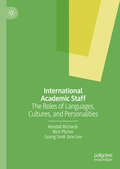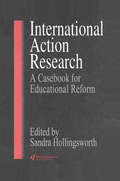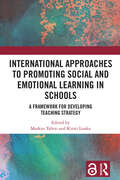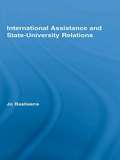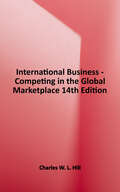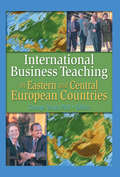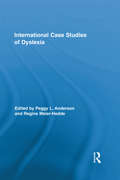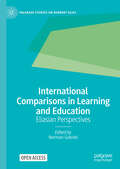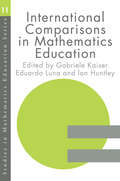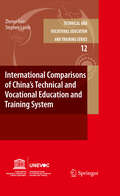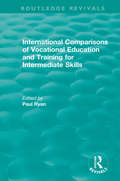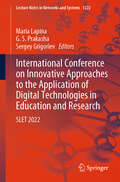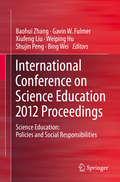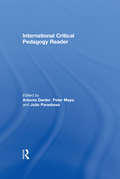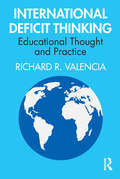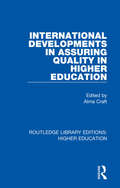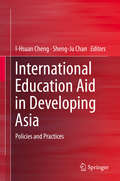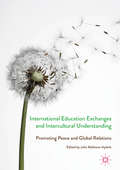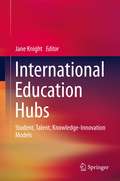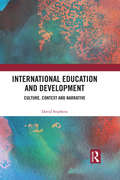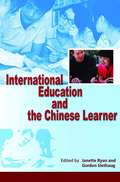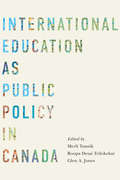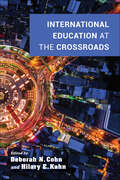- Table View
- List View
International Academic Staff: The Roles of Languages, Cultures, and Personalities
by Nick Pilcher Kendall Richards Gyung Sook LeeThis book focuses on the experiences of international academic staff in higher education, particularly examining the influences of issues such as languages, cultures, and personalities. The qualitative approach taken by the authors provides vignettes of varied international contexts, which are then compared and analysed to highlight important considerations for practice in different settings. By exploring the experiences of staff teaching within a language that is not their first language, and in a different cultural context, the authors contribute to a burgeoning area of research, and scholars working on Applied Linguistics, Higher Education, English as a Medium of Instruction and other aspects of Internationalisation are likely to find the book relevant and useful.
International Action Research: Educational Reform
by Sandra HollingsworthHow groups of people, from various educational settings worlwide, conduct research together is the subject of this book. Rather than wait for top- down policy changes in education, many practitioners are conducting research in order to implement reform from the bottom-up, the aim of this research being to progress action necessary for educational reform. The authors look at different aspects and the impact of action research on educational reform around the world, including: how do geography and philosophy affect differences on this work worldwide?; what is the political nature of groups currently taking action to improve education?; and what are the tensions between personal and instructional changes that come from participating in action research? The text also considers the effects of action research on changes in the professions including education, social work, nursing and management.
International Approaches to Promoting Social and Emotional Learning in Schools: A Framework for Developing Teaching Strategy
by Markus Talvio Kirsti LonkaThis book explores the importance of social and emotional learning (SEL) in schools to foster supportive environments and good relationships. It presents research from nine different countries with discussion of how teachers, student teachers and policymakers can ensure successful SEL at school. The book stresses the importance of social and emotional learning to allow students to become more autonomous and active in their own learning and presents very innovative ways of learning and teaching the skills. It makes the case for understanding the processes of how SEL can develop and how it can work in different cultural contexts, considering different challenges of implementing SEL within the school context. The chapters draw on theoretical discussions illustrated by practical examples and explore the role of teacher training in SEL and how SEL can be applied within the school curriculum. Discussing an increasingly important topic in the field of education around the world, this book will be of great interest to academics, researchers, educational leaders and university teacher trainers interested in developing social and emotional learning and overall well-being at school.
International Assistance and State-University Relations (Studies in Higher Education)
by Jo BastiaensThis book explores the goals, efforts and outcomes of international assistance to higher education over the past three decades and investigates how these have impacted changing State-university relations. Focusing on the case study of Indonesia, Bastiaens demonstrates how international aid facilitated and at times actively encouraged changing patterns of state-university relations from state control towards greater institutional autonomy. Through the use of various case studies from throughout the country and critical analysis of the relationships between international donors and domestic reformers, Bastiaens shows how the educational system of Indonesia was able to diversify resources, generate income, and become increasingly autonomous from government.
International Business Competing in the Global Marketplace, 14th Edition
by Charles W. L. HillMarket-defining since it was introduced, International Business: Competing in the Global Marketplace by Charles W.L. Hill (University of Washington) sets the standard and is the proven choice for International Business at the undergraduate and graduate levels. The 14th edition provides a complete solution that is relevant (timely, comprehensive), practical (focus on applications of concepts), integrated (integrated progression of topics) and the most up-to-date on the market.
International Business Teaching in Eastern and Central European Countries
by George Tesar Erdener KaynakFind out which business teaching techniques work and which don&’t for Central and Eastern European studentsFrom editor George Tesar: “Educational opportunities in Central and Eastern Europe have changed dramatically over the last twelve years. The restructuring of undergraduate and graduate programs has required a systematic rethinking of programs, courses, and teaching methods. Postgraduate education--particularly professional education and especially management education--has evolved as one of the most important elements impacting the political, social, and economic changes in that part of the world.”With this essential book, you'll explore the latest international business and management concepts that are being taught to potential managers and executives in Eastern and Central Europe. Edited by an internationally recognized expert in business management and education, International Business Teaching in Eastern and Central European Countries examines the way the economic structures of nations in transition impact the management curriculum, and looks at ways to stimulate economic development in transition economies.This thoughtfully indexed, well-referenced book also: illuminates the learning process for business students in that region suggests ways to help Eastern and Central European students get the most from case studies and business game simulations explores ways to use collaborative learning instruments when teaching entrepreneurship shows how to use networking as a vital part of increasing the management knowledge of a community or nation examines how existing companies can be used as business laboratories for teaching discusses the roles of free-market processes and government intervention in transition economies
International Case Studies of Dyslexia (Routledge Research in Education)
by Peggy L. Anderson Regine Meier-HeddeDyslexia is a disability that exists in all countries that have high expectations for literacy. The inability to read in spite of normal intellectual potential represents one of the most puzzling educational challenges for literate societies, regardless of the culture or language. This book examines medical, psychological, educational, and sociological data from comprehensive case studies of preteen dyslexic children, in order to profile the disability as it occurs in seventeen different nations. Interviews with the children and their parents reveal how children with dyslexia are identified and treated around the world, and provide a look at various perceptions of dyslexia and its challenges. Researchers and practitioners in education, psychology, and health-related professions will find this case book to be an excellent reference. Parents of children with dyslexia will find the advocacy recommendations helpful.
International Comparisons in Learning and Education: Eliasian Perspectives (Palgrave Studies on Norbert Elias)
by Norman GabrielThis Open Access edited volume addresses the important role of education in society through the lens of theoretical concepts developed by Norbert Elias. This book sets out to challenge dominant perspectives within the sociology of education by reorientating traditional debates about socialisation, childhood, early years education, care, schooling and the curriculum, focusing on the relational learning processes that lie at the heart of pedagogic relationships between parents, teachers, children and peers. It also offers an innovative perspective on some of the key debates in childhood studies, bringing together and relating the different aspects of childhood through a generational lens. Authors from different countries follow young children as they grow up and learn how to become civilized in institutions in contemporary society, discussing how from one generation to the next they learn from adults and their peers an enormous social fund of knowledge about their world.
International Comparisons in Mathematics Education
by Gabriele Kaiser Ian Huntly Eduardo LunaA critical overview of the current debate and topical thinking on international comparative investigations in mathematics education. The contributors are all major figures in international comparisons in mathematics. The book highlights strengths and weaknesses in various systems worldwide, allowing teachers, researchers and academics to compare and contrast different approaches. A significant contribution to the international debate on standards in mathematics.
International Comparisons of China’s Technical and Vocational Education and Training System
by Stephen Lamb Zhenyi GuoChina is experiencing an unprecedented phenomenon: breakneck industrialization on a scale and at a pace not seen before. It is trying to achieve in just a few decades what Western nations took more than a century to do. The arrival in the country's cities of tens of millions of rural dwellers, at most semi-skilled, has put huge strain on the country's system of vocational education, known as TVET. How have the Chinese authorities and their education administrators responded? Is China's TVET system adapting to the rapidly evolving needs of its industry? Using the province of Yunnan as a subject, this detailed case study is a closely argued and sanguine analysis of the operation of TVET in China. The authors deployed a set of internationally comparable criteria to offer a searching assessment of current performance, at the same time documenting areas of strength and weakness. The question the authors' methodology answers is how well China's TVET system is performing compared to technical and vocational education structures in other countries. In fact, they discover that in Yunnan, a province representative of the challenges faced nationwide, much has indeed been done, from a wholesale overhaul of programs to make them relevant to industry requirements, to major investment in infrastructure. Teacher training has been reformed, and take-up of professional master's and doctoral courses has been encouraged. Joint initiatives with bodies such as UNESCO have improved training and vocational education at high school level. While there is a strong international history of such comparative evaluations, which are essential for policy makers to benchmark their administration, few studies have included China despite the enormous amount of value that can be learned from that country's experience. This work will provide vital material for researchers, governments and development agencies alike.
International Comparisons of Vocational Education and Training for Intermediate Skills (Routledge Revivals)
by Paul RyanPaul Ryan has brought together the writings of the most prominent British research into vocational preparation in Britain in comparison to the other advanced economies, primarily within the EEC. The book, originally published in 1991, documents various aspects of inadequacy in British practice at the time, concentrating upon intermediate skills, which are of crucial importance for economic performance. The introduction outlines the strengths and weaknesses of comparative research. Part 1 discusses the use which has been made of it by policy makers in Britain and various aspects of comparative methods in practical comparisons, including an Anglo-Scottish one. Part 2 concerns vocational preparation in connection with productivity and produce markets, noting its importance for economic performance and its dependence upon companies’ product choices. Part 3 contains studies of the organization of skills and work and the finance of training within the EEC as a whole. Part 4 comprises studies of training in relation to labour market structures, each of which indicates similar alternatives for training policy in Britain – alternatives whose relevance and political prospects can only be enhanced by the demise of Thatcher government deregulatory policies.
International Conference on Innovative Approaches to the Application of Digital Technologies in Education and Research: SLET 2022 (Lecture Notes in Networks and Systems #1222)
by G. S. Prakasha Maria Lapina Sergey GrigorievThis book is based on the best papers accepted for presentation during the SLET-2022: International Conference on Innovative Approaches to the Application of Digital Technologies in Education and Research. The book includes research on digital pedagogy, e-learning technologies, end-to-end technologies in education, and educational transformation. The contributions in this volume highlight the significant advancements and innovative methodologies in digital education. The book provides a consolidated research exploration on contemporary themes in education such as digital teaching technologies, digital pedagogy and resources, gamification, and innovations in education with a special focus on educational technology for present and future educators. The authors of these papers have explored diverse topics, such as artificial intelligence in education, the integration of virtual and augmented reality, the development of online learning platforms, and the impact of digital tools on student engagement and learning outcomes. This collection aims to provide educators, researchers, and practitioners with insights into the latest trends and challenges in digital education. It also seeks to inspire further research and innovation in applying digital technologies to enhance teaching and learning experiences. As the landscape of education continues to evolve, the integration of digital technologies becomes increasingly critical. This book addresses a wide range of issues and opportunities, offering valuable perspectives on how digital tools can be leveraged to improve educational outcomes and accessibility. This book serves as a vital resource for comprehending the future of education and the transformative role digital technologies play in its development. By delving into the innovative approaches and cutting-edge research presented within, readers gain a deeper understanding of how digital advancements are redefining educational practices and enhancing learning experiences. The insights provided in this volume help educators develop more effective teaching strategies, incorporate new technologies into their curricula, and ultimately create more engaging and inclusive learning environments. Moreover, the book intends to foster new ideas, discussions, and collaborations that will continue to advance educational technology, thus bringing together a diverse array of research and perspectives to encourage a multidisciplinary approach to solving the complex challenges facing modern education.
International Conference on Science Education 2012 Proceedings
by Baohui Zhang Gavin W. Fulmer Xiufeng Liu Weiping Hu Shujin Peng Bing WeiThis book contains papers presented at the International Conference on Science Education 2012, ICSE 2012, held in Nanjing University, Nanjing, China. It features the work of science education researchers from around the world addressing a common theme, Science Education: Policies and Social Responsibilities. The book covers a range of topics including international science education standards, public science education and science teacher education. It also examines how STEM education has dominated some countries' science education policy, ways brain research might provide new approaches for assessment, how some countries are developing their new national science education standards with research-based evidence and ways science teacher educators can learn from each other. Science education research is vital in the development of national science education policies, including science education standards, teacher professional development and public understanding of science. Featuring the work of an international group of science education researchers, this book offers many insightful ideas, experiences and strategies that will help readers better understand and address challenges in the field.
International Critical Pedagogy Reader
by Antonia Darder Peter Mayo João Paraskeva<p>Carefully curated to highlight research from more than twenty countries, the International Critical Pedagogy Reader introduces the ways the educational phenomenon that is critical pedagogy are being reinvented and reframed around the world. A collection of essays from both historical and contemporary thinkers coupled with original essays, introduce this school of thought and approach it from a wide variety of cultural, social, and political perspectives. <p>Academics from South America, Europe, Africa, the Middle East, Asia, and North America describe critical pedagogy’s political, ideological, and intellectual foundations, tracing its international evolution and unveiling how key scholars address similar educational challenges in diverse national contexts. Each section links theory to critical classroom practices and includes a list of sources for further reading to expand upon the selections offered in this volume. A robust collection, this reader is a crucial text for teaching and understanding critical pedagogy on a truly international level. </p>
International Deficit Thinking: Educational Thought and Practice
by Richard R. ValenciaInternational Deficit Thinking: Educational Thought and Practice explores the incontrovertible reality of the persistent and pervasive academic achievement gap in many countries between marginalized students (primarily of color) and their economically advantaged White counterparts. For example, International Deficit Thinking discusses the cases of low-socioeconomic Black and Mexican American students in the United States, Indigenous Māori students in New Zealand, and immigrant Moroccan and Turkish pupils in Belgium. The predominant theoretical perspective that has been advanced to explain the school failure of marginalized students is the deficit thinking paradigm—a parsimonious, endogenous, and pseudoscientific model that blames such students as the makers of their own school failure. Deficit thinking asserts that the low academic achievement of many marginalized students is due to their limited intellectual ability, poor academic achievement motivation, and being raised in dysfunctional families and cultures. Drawing from, in part, critical race theory, systemic inequality analysis, and colonialism/postcolonialism, award-winning author and scholar Richard R.Valencia examines deficit thinking in education in 16 countries (e.g., Canada; Peru, Australia; England; India; South Africa). He seeks to (a) document and debunk deficit thinking as an interpretation for school failure of marginalized students; (b) offer scientifically defensible counternarratives for race-, class-, language-, and gender-based differences in academic achievement; (c) provide suggestions for workable and sustainable school reform for marginalized students.
International Development in Practice
by Andrea B. RughWritten for practitioners and practitioners-in-training of education development, this book reviews education issues in developing countries and provides in-depth case studies from Egypt, Pakistan, and Afghanistan.
International Developments in Assuring Quality in Higher Education (Routledge Library Editions: Higher Education #6)
by Alma CraftOriginally published in 1994, International Developments in Assuring Quality in Higher Education describes a range of national and international developments which evaluate the quality of education provided by public and private tertiary institutions. The book is based on papers from a conference organized by the International Network of Quality Assurance Agencies in Higher Education, and held in Montreal in 1993. Regional perspectives from Africa, Asia and the Pacific, Latin America, North America and Western Europe are followed by an account of national quality assurance agencies in Chile, Denmark, Korea, New Zealand, South Africa, Quebec, Romania, Scotland and the USA. There are also chapters on the work of UNESCO and the World Bank in promoting quality in higher education in industrialising nations. Together these papers supplement the account of international initiatives.
International Education Aid in Developing Asia
by I-Hsuan Cheng Sheng-Ju ChanThis book provides an Asian perspective on the timely, urgent questions of how international education aid and development should move forward and what development roles Asia should play, especially following the end of the UN Millennium Development Goals (MDGs) and Education for All (EFA) in 2015. To answer these questions, four separate but interwoven parts, which analyze and anchor education MDGs and EFA policies and practices by means of diverse case studies of donor states, recipient states, and states with a dual and transitional role in Asia, are addressed. On the basis of the analyses, a clearer and concrete direction for effectively and sustainably extending international education aid and development beyond 2015 can be derived.
International Education Exchanges and Intercultural Understanding
by Julie Mathews-AydinliThis volume examines the complex role of international education exchange in promoting peace and intercultural understanding. The perception that international education encourages greater understanding and cooperation between, people, cultures, and nations continues to drive participation and resources to this growing sector. With thought-provoking theoretical discussions and a broad range of case studies, this volume provides a much needed critical exploration of the ways in which international education exchanges may impact individuals as well as broader issues of global peace and development.
International Education Hubs
by Jane KnightEducation hubs are the newest development in the international higher education landscape. Countries, zones and cities are trying to position themselves as reputed centres for higher education and research. But given higher education's current preoccupation with competitiveness, branding, and economic benefits are education hubs merely a fad, a branding exercise, or are they an important innovation worthy of serious investment and attention? This book tries to answer the question through a systematic and comparative analysis of the rationales, actors, policies, plans and accomplishments for six serious country level education hubs - United Arab Emirates, Qatar, Malaysia, Hong Kong, Singapore and Botswana . The in-depth case studies shows that "one size does not fit all". A variety of factors drive countries to prepare and position themselves as an education hub. They include income generation, soft power, modernization of domestic tertiary education sector, economic competitiveness, need for trained work force, and most importantly a desire to move towards a knowledge or service based economy. In response to these different motivations, three different types of education hubs are being developed: the student hub, talent hub, and knowledge/innovation hub. Scholars, policy makers, professionals, students and senior decision makers from education, economics, geography, public policy, trade, migration will find that this book challenges some assumptions about crossborder education and provides new insights and information.
International Education and Development: Culture, Context and Narrative (Bristol Papers In Education : Comparative And International Studies)
by David StephensDrawing on a wide range of international contexts, International Education and Development provides an innovative and comprehensive critique of developments to improve schooling in the global South. Offering both a theoretical critique of the field and a series of case studies, drawn from recent research, illustrating the usefulness of a narrative approach, it generates a greater understanding of the meta-narratives that shape development and international education. Focusing on three periods of extensive field work in South Africa, Bangladesh and Mauritius, this book reflects upon the combination of narrative and biographical approaches in different national settings. Context is provided in three levels, meta, meso and micro, through a clear and critical examination of the macro ‘stories’ of development and international education over the past fifty years, and an examination of the role that narrative can play at local and micro levels, looking at the stories of individual decision makers – from children in the classroom to education officers at the district education office – and the opportunities and challenges of using these accounts for research, teaching and policy-making purposes. International Education and Development adds a global perspective to an area dominated by a concern with the Northern industrialised world, making it an essential text for students following courses in the social sciences, and individuals working the field of international education. It addresses a fundamental concern of development theory in a unique and engaging manner. A highly original contribution to a growing field, this book synthesises developments both in this field and in the growing topic of narrative research.
International Education and Foreign Languages: KEYS TO SECURING AMERICA'S FUTURE
by National Research Council of the National AcademiesInternational Education and Foreign Languages reviews the Department of Education’s Title VI and Fulbright-Hays Programs, which provide higher education funding for international education and foreign language programs. This book offers a timely look at issues that are increasingly important in an interconnected world. It discusses the effect of the nation’s lack of expertise in foreign languages and cultural knowledge on national security and global competitiveness and it describes the challenges faced by the U.S. educational system and the federal government in trying to address those needs. The book also examines the federal government’s recent proposal to create a new National Security Language Initiative, the role of the Department of Education, and current efforts to hold higher education programs accountable. This book provides information and recommendations that can help universities, educators, and policy makers establish a system of foreign language and international education that is ready to respond to new and unanticipated challenges around the world.
International Education and the Chinese Learner
by Janette Ryan Gordon SlethaugInternational Education and the Chinese Learner is one of the first full-length studies in the relatively new field of transnational pedagogy to explore the role of the Chinese learner in international schools and universities across the globe. It describes the unprecedented growth of international schools and university exchange programs during the past decade together with the way in which Chinese learners at all levels have taken advantage of these opportunities and have been scrutinized in the process. The results of this internationalization have in some cases solidified stereotypes about Chinese learners and in other instances have helped to overcome those prejudices. Teachers within the international schools comment about the challenges of integrating students from different ethnic and national backgrounds in their schools and about the rewards of developing intercultural programs that will give the students the most substantial, diverse, and ethical education and encourage cross-cultural understanding, build academic skills, and develop character. University teachers - both Chinese and Western - describe the opportunities and challenges for cross-cultural teaching and learning within the classrooms of their own countries and in global classrooms where local and international teachers together advance new perspectives based on team teaching, interdisciplinarity, and intercultural enquiry.
International Education as Public Policy in Canada
by Merli Tamtik, Roopa Desai Trilokekar, and Glen A. JonesIn the early twenty-first century international education emerged as an almost ubiquitous concept within discussions of educational curriculum; the objectives of schools, universities, and colleges; and government policies for K–12 and higher education. Although far from a new phenomenon, many jurisdictions now view international education as a highly competitive global industry. This book provides a comprehensive analysis of international education policy in Canada, tracing the complex history of when, how, and why it emerged as a policy area of strategic importance. Illuminating a uniquely Canadian perspective, influenced by regional interests and federal-provincial tensions, International Education as Public Policy in Canada addresses challenging questions: Why was Canada a latecomer in addressing this policy issue? What is the relationship between international education and Canadian immigration policy? How did international education develop as a major Canadian industry? The resulting essays from leading scholars contribute not only to the growing Canadian literature on international education policy but also to a critical, global conversation. Contemplating where the Canadian story of international education is headed, International Education as Public Policy in Canada calls for a broader debate on ethical practices in internationalization, focusing on inclusion, equity, compassion, and reciprocity.
International Education at the Crossroads (Well House Books)
by Deborah N. Cohn and Hilary E. KahnInternational Education at the Crossroads captures the essence and complexity of international education in an interconnected and globalized world. Written by leading scholars, international educators, and policy makers, the 26 essays in this volume take stock of the unpredictable landscape of international education and demonstrate why international higher education is more essential now than ever before. Responding to a timely global moment where education and international engagement are being redefined and practiced in new ways, the authors call for a reconsideration of paradigms and critical reflection of the entire field of international education. At the same time, the authors show how international education is an imperative for the future of learning and the world, and also, crucially, that this work cannot be done in a silo. International Education at the Crossroads offers readers a chance to join in the conversation that is as global as it is meaningful in communities, the lives of learners, and institutions around the world. International education requires that everyone the world over work together to produce new knowledge, to navigate the "crossroads," and to collectively chart the directions in which the field will move into the future.
